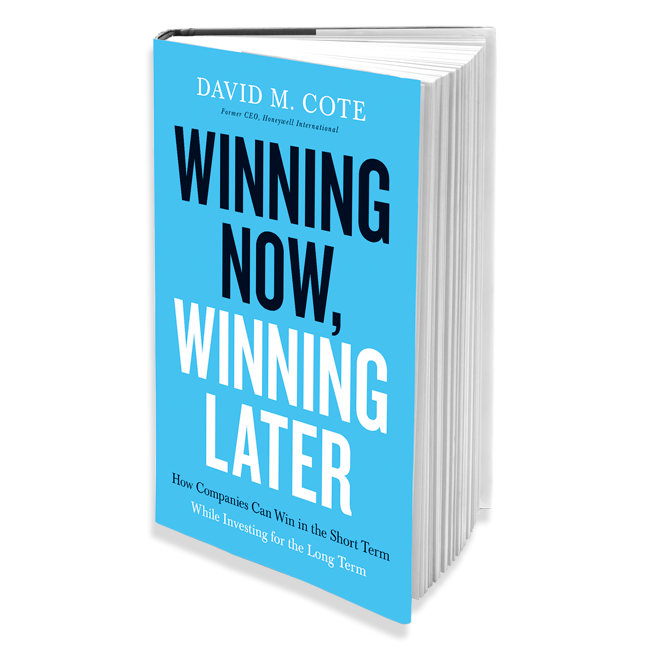霍尼韋爾前首席執(zhí)行官高德威(David Cote)談論企業(yè)領(lǐng)導力的新書《贏在當下,,贏在未來》(Winning Now, Winning Later)已于6月30日上架。按照《財富》雜志此前的說法,這本大部頭巨著堪稱商業(yè)書籍中的《戰(zhàn)爭與和平》(The War and Peace)。此書不僅洋溢著彌足珍貴的管理經(jīng)驗,,還講述了許多引人入勝的美國企業(yè)故事。它很有可能成為激勵新一代領(lǐng)導者的典范之作,。

這本書主要論述了每位領(lǐng)導者所面臨的緊張局面:既要滿足華爾街當下的要求,,又要投下重注來確保未來的發(fā)展。
但在個人層面,,高德威也深入研究了領(lǐng)導力問題,,包括他自己如何從瑣碎的日常工作中擠出時間來思考重大課題。他列出了有效領(lǐng)導大型組織所需的三大要素:調(diào)動團隊的積極性,、選擇正確的方向,、讓人們朝著這個方向前進。
他寫道:“大多數(shù)人過分重視第一點,。”令人驚訝的是,,在高德威看來,,集結(jié)隊伍只占全部工作的5%?!八l(fā)表寓意崇高的演講無關(guān),。”成功取決于另外95%的工作,,即制定正確的戰(zhàn)略,,并及時跟進,以確保該戰(zhàn)略執(zhí)行到位,?!芭c動員團隊相比,,這是一項更基礎(chǔ)的工作?!?
他告訴我,,“如果你確定好了戰(zhàn)略和方向,你就可以把95%的時間用在改善執(zhí)行方面,,這反過來又會降低成本,,從而騰出更多的現(xiàn)金用于季度利潤和新投資?!?
為了確保自己有足夠的空間進行深入思考,,并確定方向,高德威采用了一套非常規(guī)做法,。
在他的整個職業(yè)生涯中,,高德威每個月都會留出兩到三天的時間,不作任何工作安排,,只是專心致志地思考旨在引領(lǐng)霍尼韋爾駛?cè)胄路较虻拇竽懹媱潯蛘咦鲆恍┞市远鵀榈氖虑椤?strong>他把這些日子稱為“X天”,。
“由于緊急情況,我失去了一些X天,,但每年我確實會利用大約20個這樣的日子,。”他說,,“比如,,我可能會在事先完全沒有打招呼的情況下,突然造訪工廠,?!?
在路易斯安那州一家工廠發(fā)生事故,導致一名工人身亡之后,,高德威沒有告訴任何下屬,,就在一個X天飛抵該州,然后租車前往事發(fā)工廠,?!拔抑皇遣幌嘈潘麄円呀?jīng)解決了安全問題。我沒有提前通知,,以便親眼目睹工廠和工人的實際情況,。我不想聆聽那些事先排練過的故事,更不想看到為了應付我而粉刷一新的墻壁,?!备叩峦f。
在剩余的X天,他經(jīng)常進行不拘泥于固定模式的思考,?!拔医?jīng)常待在辦公室里?!彼貞浀?,“那里有一個巨大的魚缸,但在最初那幾天,,我并沒有意識到它有多美,。我在流媒體上隨機播放1.2萬首歌曲,聽的音樂從爵士樂,、鄉(xiāng)村音樂到嘻哈音樂,,從另類搖滾到歌劇,無所不包,。有些人覺得這會讓人分心,。但我覺得嘻哈音樂很有啟發(fā)性?!?
高德威把專門用來思考的日子稱為“藍皮書日”,,因為他經(jīng)常把自己的想法記在一個藍色筆記本上?!拔胰斡勺约旱乃季w肆意漂浮,,但并非漫無目的地?!彼诮邮懿稍L時說,,“我會嘗試著構(gòu)思一些大的想法。正是在一個‘藍皮書日’,,我萌發(fā)了學習豐田生產(chǎn)系統(tǒng)的念頭,,并由此開發(fā)出了后來的霍尼韋爾操作系統(tǒng)?!?
我們建議所有的培訓領(lǐng)導者在接下來的X天悉心閱讀高德威的大作,。(財富中文網(wǎng))
譯者:任文科
霍尼韋爾前首席執(zhí)行官高德威(David Cote)談論企業(yè)領(lǐng)導力的新書《贏在當下,贏在未來》(Winning Now, Winning Later)已于6月30日上架,。按照《財富》雜志此前的說法,,這本大部頭巨著堪稱商業(yè)書籍中的《戰(zhàn)爭與和平》(The War and Peace)。此書不僅洋溢著彌足珍貴的管理經(jīng)驗,,還講述了許多引人入勝的美國企業(yè)故事。它很有可能成為激勵新一代領(lǐng)導者的典范之作,。
這本書主要論述了每位領(lǐng)導者所面臨的緊張局面:既要滿足華爾街當下的要求,,又要投下重注來確保未來的發(fā)展。
但在個人層面,高德威也深入研究了領(lǐng)導力問題,,包括他自己如何從瑣碎的日常工作中擠出時間來思考重大課題,。他列出了有效領(lǐng)導大型組織所需的三大要素:調(diào)動團隊的積極性、選擇正確的方向,、讓人們朝著這個方向前進,。
他寫道:“大多數(shù)人過分重視第一點?!绷钊梭@訝的是,,在高德威看來,集結(jié)隊伍只占全部工作的5%,?!八l(fā)表寓意崇高的演講無關(guān)?!背晒θQ于另外95%的工作,,即制定正確的戰(zhàn)略,并及時跟進,,以確保該戰(zhàn)略執(zhí)行到位,。“與動員團隊相比,,這是一項更基礎(chǔ)的工作,。”
他告訴我,,“如果你確定好了戰(zhàn)略和方向,,你就可以把95%的時間用在改善執(zhí)行方面,這反過來又會降低成本,,從而騰出更多的現(xiàn)金用于季度利潤和新投資,。”
為了確保自己有足夠的空間進行深入思考,,并確定方向,,高德威采用了一套非常規(guī)做法。
在他的整個職業(yè)生涯中,,高德威每個月都會留出兩到三天的時間,,不作任何工作安排,只是專心致志地思考旨在引領(lǐng)霍尼韋爾駛?cè)胄路较虻拇竽懹媱潯蛘咦鲆恍┞市远鵀榈氖虑?。他把這些日子稱為“X天”,。
“由于緊急情況,我失去了一些X天,,但每年我確實會利用大約20個這樣的日子,?!彼f,“比如,,我可能會在事先完全沒有打招呼的情況下,,突然造訪工廠?!?
在路易斯安那州一家工廠發(fā)生事故,,導致一名工人身亡之后,高德威沒有告訴任何下屬,,就在一個X天飛抵該州,,然后租車前往事發(fā)工廠?!拔抑皇遣幌嘈潘麄円呀?jīng)解決了安全問題,。我沒有提前通知,以便親眼目睹工廠和工人的實際情況,。我不想聆聽那些事先排練過的故事,,更不想看到為了應付我而粉刷一新的墻壁?!备叩峦f,。
在剩余的X天,他經(jīng)常進行不拘泥于固定模式的思考,?!拔医?jīng)常待在辦公室里?!彼貞浀?,“那里有一個巨大的魚缸,但在最初那幾天,,我并沒有意識到它有多美,。我在流媒體上隨機播放1.2萬首歌曲,聽的音樂從爵士樂,、鄉(xiāng)村音樂到嘻哈音樂,,從另類搖滾到歌劇,無所不包,。有些人覺得這會讓人分心,。但我覺得嘻哈音樂很有啟發(fā)性?!?
高德威把專門用來思考的日子稱為“藍皮書日”,,因為他經(jīng)常把自己的想法記在一個藍色筆記本上?!拔胰斡勺约旱乃季w肆意漂浮,,但并非漫無目的地,?!彼诮邮懿稍L時說,,“我會嘗試著構(gòu)思一些大的想法。正是在一個‘藍皮書日’,,我萌發(fā)了學習豐田生產(chǎn)系統(tǒng)的念頭,,并由此開發(fā)出了后來的霍尼韋爾操作系統(tǒng)?!?
我們建議所有的培訓領(lǐng)導者在接下來的X天悉心閱讀高德威的大作,。(財富中文網(wǎng))
譯者:任文科
In his new book on corporate leadership, Winning Now, Winning Later, which debuts June 30, former Honeywell CEO David Cote has written what Fortune previously dubbed?The War and Peace?of business books. The tome, which is packed with management lessons and riveting stories from the trenches of corporate America and hits shelves June 30, is likely to inspire a new generation of leaders in training.
The book primarily deals with the tension every leader faces: satisfying Wall Street today, while still placing the big bets that will ensure growth down the line.
But on a personal level, Cote also delves deep about leadership, including his own processes for finding time to think big thoughts amid the daily grind. He lays out three elements of leading a large organization effectively: mobilizing groups of people, picking the right direction, and getting people moving in that direction. "Most people overemphasize the first one," he writes. Surprisingly, Cote says that rallying the troops is only 5% of the job. "It's not about giving lofty speeches," he writes. Ninety-five percent of success is setting the right strategy and following up to ensure it's carried out. "It's even more basic than that," he told me. "If you get the strategy and direction right, you can spent 95% of the time on improving execution, which in turn lowers costs and frees up more cash both for quarterly profits and new investment."
And Cote highlights his own unorthodox routine for making sure he had enough space to think and set that direction. Throughout his career, Cote set aside two or three full days a month with nothing on his schedule so that he could hatch daring plans to take Honeywell in new directions, and for other modes of improvisation. He called them "X days." "I lost some of the X days because of emergencies, but I did use about 20 a year," he says. "I'd use some of them to make surprise visits to plants totally unannounced." After a worker died in an accident at a plant in Louisiana, Cote hopped a flight on an X day without telling anyone on his staff, then rented a car and drove to the factory. "I just didn't trust that they'd resolved the safety issues. I didn't give any advanced notice so I could see the plant and the people exactly as they were, and didn't have to listen to rehearsed stories or see freshly painted walls," says Cote.
The remainder of the X days he used for unstructured thinking. "Often I'd just stay in my office," he recalls. "I had a big, gorgeous fish tank, but after the first few days I didn't notice how beautiful it was. I had 12,000 songs that I'd put on random streaming, listening to everything from jazz to country to hip-hop to alternative rock to opera. Some people find that distracting. I find hip-hop inspiring."
Cote dubbed the days reserved for reflection as "blue book days" because he would jot down his ideas in a blue notebook. "I just let my mind wander, but not aimlessly," he said in an interview. "I'd try to come up with big ideas. It was on a blue book day that I hatched the idea to study the Toyota Production System and develop what became the Honeywell Operating System."
We'd recommend any leaders in training spend their next X day reading Cote's book.






